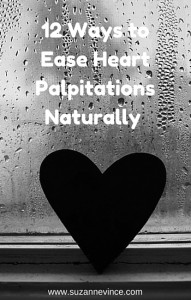In the first part of this series, I shared my personal journey with heart palpitations that began forty years ago. I also shared what I believe to be the primary causes of them. If you missed that post, click here to read it. Today I’m talking about what works.
And so, without further ado, let’s get started:
(1) Magnesium Taurate – According this article put out by Natural News, an estimated 68 to 80 percent of the United States population is deficient in magnesium, an essential mineral which, among other things is responsible for maintaining a normal heart rhythm.
The article states that the major cause of this widespread deficiency is the result of 1) our growing dependence on processed food and, 2) soil erosion, which has significantly depleted the mineral content of our soil. As a result, many fruits and vegetables that were once rich in magnesium no longer contain it in adequate amounts, resulting in widespread deficiencies.
The good news is that supplementing with magnesium is simple and relatively inexpensive. The question then becomes, what kind of magnesium should I try?
Magnesium taurate is the best choice for people with heart arrhythmias. As you can see from the reviews of this product on Amazon, many people have found complete relief by taking it. And was I to argue with that? I bought myself some immediately.
Warning:
Within a day or two of taking magnesium taurate, my seemingly endless heart palpitations subsided. I was really stoked and thought I’d found my miracle cure. But after a couple of weeks, the palpitations returned with a vengeance.
It occurred to me that since the only change I’d made in my life was the magnesium, perhaps the magnesium itself was causing the palpitations. So I summoned Doctor Google and found this:
Signs of excess magnesium can be very subtle and can occur with long-term use of magnesium supplements and laxatives. The symptoms can be similar to magnesium deficiency and include: changes in mental status, nausea, diarrhea, loss of appetite, muscle weakness, difficulty breathing, extremely low blood pressure, and irregular heartbeat.
So I backed off the magnesium (I was taking 4-125mg capsules per day) and after a couple of days, my palpitations eased up. They didn’t go away completely, but they did subside significantly.
I will reintroduce the magnesium taurate back into my system because it did offer some relief, but I’ll stick with one capsule.
Before rushing to your doctor to determine if you’re magnesium-deficient, read this article first.
(2) Avoid caffeine and other stimulants – Avoiding caffeine and other stimulants is another quick fix you can make. If you haven’t already sworn off regular coffee, energy drinks, even green tea (yes, it does have caffeine), do so now. It isn’t that hard and the effect on your heart palpitations will likely be profound.
I stopped drinking caffeine when I first started having heart palpitations. I noticed right away that drinking soda would make my heart go crazy. Today there are more beverages that include stimulants than I can count.
And it isn’t always easy to tell which products to avoid. Today manufacturers are using ingredients like taurine, guarana and ginseng. All are stimulants and will cause heart palpitations, especially on an empty stomach.
A word about alcohol:
I used to run a support group for fellow MVPS sufferers, and one thing I heard from a lot of folks was that alcohol often caused heart palpitations. I don’t (usually) have this problem but just something to keep in mind.
(3) Sleep – I cannot emphasize enough how important sleep is for people who suffer from heart palpitations. Good quality, restorative sleep. Unfortunately, if you’re anything like me, a quality night sleep is hard to come by.
Even when I follow all the rules (such as: going to bed at the same time every night, not watching television before bed, not turning on any bright lights before bedtime, etc), I still rarely get a solid night of sleep.
However, what I’ve noticed over the decades I’ve had heart palpitations is that, even after a lousy night’s sleep, I do not get them in the morning (though I might get them during the night).
For me, the earliest the palpitations start is late morning to early afternoon, but the better I’ve slept, the later they start! Sometimes after an especially good night’s sleep, I won’t have them at all.
A word about sleep aids:
I’ve tried several sleeping aids ranging from melatonin to Ambien, and they do help some. Melatonin, a natural hormone made by your body, regulates the natural cycles of sleep and wakefulness. It is available over the counter and works pretty well for me.
Ambien, and other prescription sleep medications, can be useful but come with certain risks and side effects. They should be used with caution.
(4) Exercise – Since fatigue is the most common complaint of MVPS sufferers, exercising can be a challenge. Trust me when I say I understand. Until a decade ago I was a yo-yo exerciser. I exercised haphazardly, at best.
But the thing I noticed was, when I was exercising regularly, I not only felt better physically (not to mention mentally and emotionally), I had fewer heart palpitations.
Here are a few tips to help avoid heart palpitations when exercising:
First, don’t stop suddenly. Take time to cool down and catch your breath. I’ve personally found that if I sit down when I’m still winded, my heart is much more likely to skip.
Time of day makes a difference, too. When I used to exercise during the evening (right after work and before dinner), I would sometimes get palpitations during exercise. I’ve since switched to morning workouts (trust me, this took a while to adjust to as I was not a morning person) and this is no longer an issue. I have never had palpitations during my morning workouts.
If you’re tied to working out in the afternoon or evening and you’re experiencing occasional heart palpitations, try eating half of a protein bar 15-30 minutes before your workout.
As I mentioned in the first part of this article, low blood sugar will frequently cause me heart palpitations if I don’t eat something as soon as I notice myself feeling a little jittery, and always when I exercise while I’m feeling this way. Even walking up a flight of stairs will make my heart bounce like a basketball.
If you still have trouble with heart palpitations during exercise, you may want to try yoga (see number 9 below) as it focuses on the breath which can help lessen palpitations.
(5) Valsalva Maneuver – In addition to heart palpitations, once in a while I’ll have an episode of tachycardia (an abnormally rapid heartbeat). During one of these episodes, the heart gets “stuck” in fast gear.
I discovered the Valsalva maneuver completely by accident in a desperate attempt to get my heart unstuck and beating normally again.
If you ever have an episode of tachycardia, draw in a deep breath, hold it in, and bear down as though you’re trying to take a poop. Bear down as hard as you can.
If it doesn’t work, repeat the move until it does. I just had an episode like this a few days ago. It took me a few attempts before my heart finally returned to a normal rhythm.
(6) Hydration – One of the first thoughts to enter my mind when I start having heart palpitations (right after the “oh sh*!, not again!”) is whether I’ve been drinking enough (non-caffeinated) fluids.
During the week at work, I have I a routine I follow which includes drinking one large container of water (20 ounces) in the morning and another in the afternoon (in addition to whatever I’m drinking at lunch).
On weekends, however, I’m far more likely to get dehydrated. I’m out of my routine and often too busy to think about whether or not I’m drinking enough water. I sometimes wake up in the morning (or during the night) with heart palpitations. When I do, I immediately reach for the bottle of water on my bedside and drink as much as I can. Quite often, the palpitations will subside within a few minutes.
(7) Position – I sometimes get palpitations when I’m in a reclined position. Returning to an upright position will often alleviate the problem. When I’m going through an especially rough period of them, sometimes lying flat on my back (no pillow under my head) for a few minutes during the day helps.
If I get palpitations at night when lying in bed, sometimes lifting my left arm over my head will help calm the heart down (this works when sitting too). And, if lying on a particular side causes them, turn over (or lie on your back).
As I mentioned in the first part of this series, Mitral Valve Prolapse Syndrome = Mitral Valve Prolapse + Dysautonomia. But what is dysautonomia anyway, and what does it have to do with heart palpitations?
During my visit to the Mitral Valve Prolapse Clinic in Birmingham, Alabama, the doctor I saw explained dysautonomia this way:
We know the autonomic nervous system controls, among other things, the heart rate. When a car cuts you off or someone jumps out from the bushes and scares you, your autonomic nervous system sends a surge of adrenaline into your body and increases your heart rate, makes you more alert and capable of dealing with the “crisis” before you.
People with dysautonomia have a “faulty” autonomic nervous system. You can be in bed, or taking a bath, or relaxing on the sofa and your brain receives a false message that you are in distress. In response, it dumps adrenaline into your body when you don’t need it.
People with MVPS have hearts that are very sensitive to electrical activity and this surge of adrenaline is like a shockwave to the heart. Our hearts respond by not only speeding up but skipping beats.
The extra (unneeded) adrenaline also causes panic, which can exacerbate the effect and make the heart palpitations worse. It becomes a vicious cycle.
Medications can sometimes help block the electrical activity (see Bonus Round below), but there are a number of things you can do to help lower the “autonomic threshold,” which essentially means reducing the electrical activity to the heart (which translates into fewer heart palpitations).
I have personally practiced each of the next 4 activities and can attest to their ability to produce the desired results: fewer heart palpitations.
(8) Meditation – There are many forms of meditation. There are guided meditations, silent meditations, meditations using mantras, etc. For years I used a 20 minute guided meditation by Brian Weiss. I still love this meditation, but I started yearning for a silent meditation instead.
A few months ago, I downloaded The Mindfulness Ap ($2.99 for iphone, $1.99 for android), which offers both guided and silent meditations. You can select the length of time for the meditation as well as the intervals at which a soft bell chimes (which serves to drag me away from the thoughts that inevitably creep in and back to my meditation).
But meditation need not be a formal thing. You can meditate anywhere, anytime, for any length of time you have available. Even a few minutes with your eyes closed in a relaxed state will help.
I try to meditate at least once a day, even if it’s only for 5 minutes at a time. I find that quieting my mind helps lower that stress threshold and over time, if practiced regularly, will lessen my palpitations.
There are times during meditation that my mind will not shut down. Random thoughts will pop into my mind. Sometimes the thoughts come in a steady stream. This is completely normal, but unfortunately, causes most people to give up entirely.
To help combat the thoughts, I focus on my breathing…in and out, in and out…sometimes counting the breaths to 10 and then starting over (and always start over if you lose count). Sometimes I focus instead on keeping my eyebrows level…not letting them move up or down with my breath. Sounds funny, but it really helps to keep the thoughts at bay.
When my brain just won’t turn off, I use another app called the Breathing Zone. This app allows you to set the number of breaths per minute you want to start with, the number you want to end with, and the duration. For example, I might want to start at 10 breaths per minute and go down to 6 over a five minute period. A voice (you decide male or female) tells you when to breathe in and out. You can even pick the relaxing background sound (I like Flowing Water).
Regardless of what happens during the few minutes you take to meditate, you’ll always be more relaxed afterward. I try to do some form of quiet breathing throughout the day. I even set an Outlook reminder every 30 minutes to close my eyes and take three deep breaths. You can do this with your eyes closed or open.
(9) Yoga – I just started yoga about two years ago and absolutely love it! It’s a great workout centered around the breath. There are several different types of yoga, so be sure to try different kinds until you find the one that works best for you.
I personally prefer Vinyasa yoga. It’s an athletic, flow-based yoga that focuses on “one-breath, one-movement” using Ujjayi breath (pronounced oooh-jie-ee). This type of breathing is so effective in not only calming me but controlling my heart rate that I use it many times throughout the day.
At the end of a yoga session, I feel strong but also relaxed. You can’t help but leave whatever stress you came in with on the mat. And for any of you guys reading this, yoga is NOT just for women. At least a third of the people in the classes I go to are men!
(10) Biofeedback – Biofeedback works on the conscious mind. It teaches you to control certain body functions, such as heart rate. In biofeedback, you’re connected to electrical sensors that help you receive information (feedback) about your body (bio). This “feedback” helps you focus on making subtle changes in your body, such as relaxing certain muscles.
I first tried biofeedback around 20 years ago. My goal: learn how to relax and quiet my mind (ie lower my autonomic threshold) and thereby lessen the frequency and severity of my heart palpitations.
The therapist attached the electrodes to my shoulders, which was where I carried my stress back then. Relaxing music played in the background, which helped me relax. When I would start to hunch my shoulders, a gentle beeping sound would remind me to relax them.
Nowadays you can buy biofeedback machines and apps to use at home. One I discovered while researching this article is the Heartmath Inner Balance which will help you manage your stress by monitoring your heart and breathing rates and reminding you to focus on positive thoughts. I haven’t used this app and make no claims about its efficacy in managing heart palpitations, but it does look pretty neat.
(11) Neurofeedback – Unlike biofeedback, neurofeedback works on the unconscious mind, which includes the autonomic nervous system. As I mentioned above, the autonomic nervous system controls our heart rate. A faulty autonomic nervous system can send false electrical signals to the heart, causing heart palpitations.
Neurofeedback is like a workout for the brain. It receives and translates information from the brain (using small electrodes clipped to your ear and your head) and provides “feedback” to help train the brain and eliminate inefficiencies.
Here’s how it works. The electrodes are placed on your ears and scalp (four altogether). They are then fed into the software which interprets the brain activity. While you listen to soothing music, the brain sends signals (via the one-way electrodes) to the software.
When the software identifies an inefficiency (in the brain), it “interrupts” the music. You hear a slight skip (akin to a skip on an old record album when it hit a piece of dust, for example). Your brain uses that “feedback” to train itself to become more efficient.
At the time of writing this article, I’ve had 9 sessions. I noticed an immediate and significant reduction in palpitations. Coupled with the magnesium taurate, I had a couple of weeks without palpitations. Even now that they are back, they are far less frequent and pronounced.
If you really want to take care of your nervous system, try Nerve Shield Plus. Nerve damage can cause all sorts of other conditions such as the loss of limbs! Take care of your nerves and your whole body will thank you!
(12) Acceptance – This perhaps is the most bitter pill to swallow. As M. Scott Peck says in the opening line to The Road Less Traveled: “Life is difficult. Once we…truly understand and accept it-then life is no longer difficult.”
I’m not sure I agree with the last part of that statement, but I do agree that acceptance is vital in order to move forward with our lives when we are suffering from a chronic condition. It’s taken me forty years to fully realize (and accept) that MVPS is something I am going to have to deal with for the rest of my life.
Sometimes, when the palpitations are especially bad, I cry. And get angry (at God, the universe, fate). But eventually the sun rises again and my battle-weary soul begins to heal and I remember all that I have accomplished in my life, despite the challenges I’ve faced. I am living proof that we can not only survive but thrive and accomplish great things if we are strong enough to pick ourselves up when we fall, dust ourselves off and come back stronger than before.
Bonus Round
Medication – Though this doesn’t exactly fall under the “natural” remedies category, I thought a discussion about medications was necessary.
Beta blockers and calcium channel blockers can be useful in controlling heart rhythm. I’ve been taking a beta blocker for a couple of years now and I really can’t say whether it’s helping or not. Since I began taking it, I haven’t noticed a reduction in my symptoms. In fact, recently I began decreasing the dosage to see if I notice any increase in activity. So far I have not.
Anti-anxiety medications can be also useful at times. It took me many years to really believe that I was not going to die from my heart palpitations. And still, when they get really bad, I wonder. Fear will always make your palpitations worse. Anxiety—that constant worry that they’re going to start—will almost certainly bring them on.
If you can learn to control your fear and/or anxiety, the severity of your palpitations will lessen. To this point, if the above techniques (meditation, yoga, bio or neuro feedback) do not help control the fear and anxiety, you may want to consider a medication you can take as needed (such as Xanax, valium, etc).
My hope in writing this three-part series about heart palpitations is that everyone who suffers from them will find something useful, something they haven’t tried, and as a result will find some relief.
So, what did you think? Do you suffer from heart palpitations? Were any of these suggestions helpful? Do you have any other suggestion that have helped you?
UP NEXT:
Join me next week for Breathing Space: 5 Ways to Find Quiet in a World That Never Sleeps
Don’t want to miss a post? Enter your email in the blue box up there
on your right to receive my next blog post directly to your email.












Pamela
So many good tips! I’m glad you suggested yoga for me this year. It’s perfect addition to my workout regime. I use the breathing and some postures when my heart acts up.
Suzan KUM
I am diagnosed with MVP , and have palpitation and mis heartbeats very often . Thanks for your good tips. Its been very usefull
JH
Thank you for sharing. I have had heart palpitations ongoing for 7 months now with no diagnosis. I feel like I am left to trying to figure something out on my own. I am thankful to have come across your post. I have seen a naturopath and he suggested a supplement called Taurine that I have been trying. Thank you again for taking the time to share your story.
Suzanne Vince
Hi Jenni. Thanks for sharing a little of your story. After a 6 month 24/7 bout of them (worst in 40+ years of them), I found relief through mindfulness meditation. Reply to this post if you’d like to hear more and I will email you privately.
Steph
Hi there. I have PVC and PACs that bother me about 3 times per minute on most days (after I had my 3rd child). I am still feeling like I am dying even though I have been told by my cardiologist that these are not going to kill me. Thank you for this site!! I had the exact same experience as you with Magnesium Taurate. It was such a lifesaver for one month, then I am back to where I started too. I am so confused as well as to why the palpitations came back as I thought Magnesium was the cure.
I have been prescribed a beta-blocker, but I want to try other things first. One thing that helps for about a week or two is having a chiropractic adjustment. It seems to lessen them for a few weeks. I saw a natural doctor and was told to try avoiding fluoride in water and look into the blood-type diet. I am interested in biofeedback as I have not tried that. Thank you again for this article. I am excited to see if I get any relief with biofeedback or meditation. I am so glad I am not alone in this awful condition!
Also, can you please send me more info on your meditation technique?
Suzanne Vince
Hi Stephanie,
Please email me through my website and I’ll be happy to share my meditaton process with you.
Cheers,
Suzanne
Vincent Farnan
Thank you. Reasurring that I’m not suffering this horrible condition on my own.
Suzanne Vince
Hi Vincent. I too find comfort in knowing I’m not alone…I just wish nobody had to go through this. A couple years ago, I found relief through mindfulness meditation. If you’d like to learn more about it, just reply to this post if you’d like to hear more and I will email you privately.
Shawn Michael
Can you email me more info on your meditation practice?
Erika
Would love to learn more about mindfulness mediation. Please email me since I have now been suffering from palpitations since shortly after the birth of my daughter, she is almost 20 months.
Thank you!
Suzanne Vince
Hi Erika,
Thanks for sharing. I will reach out privately and we can discuss meditation…one of my favorite topics!
Suzanne
Wendy
I am so thankful and blessed to have come across your post! I have been having heart palpitations for awhile but on and off and they have done everything and have found nothing that is serious to my heart which is a good thing,but the feeling when I have them just freaks me out and makes my anxiety shoot up.so reading your post makes me feel alot better ….Thank you so much.
Suzanne Vince
Hi Wendy,
I’m so glad you reached out. I’ll email you privately so we can discuss more.
Suzanne
Susan Sumner
Yes!!!! Im not alone, thank you
Suzanne Vince
Hi Susan,
You’re most definitely not alone! Thanks for posting.
Cheers,
Suzanne
Joshua Gannaway
I found this article pretty comforting. As of the last month I have had a lot of various things happen in my life that caused me to have panic attacks and anxiety. It has gotten so bad that when I lay down at night my heart will start beating hard, I recognize it, anxiety from that builds up and I cannot sleep. It’s like I am so exhausted and want to sleep and get really close to being asleep and my heart jumps waking me up. Has anyone dealt with this nightly? I know how important rest is for the body and cannot seem to get it. I am now trying Zoloft a low dosage to hopefully help with it. It’s crazy bc all of this literally just came out of no where. Do you know any otc sleep meds that may help push me past the palpitations? Any help would be greatly appreciated.
I should also note I have been to two doctors and an emergency room all being told there is nothing wrong with me after a thyroid test, blood work, 2 EKG, and x Ray. I am also a Christian and begging for relief from God daily, because I have four beautiful children who need me.
Suzanne Vince
Hi Joshua,
Thanks for reaching out. I’m sorry about the anxiety and sleep issues…I’ve been there! I’ll reach out to you privately.
Cheers,
Suzanne
Laura
Hi,
I know this is an old post but my friend has the same issue and his cardiologist prescribed a beta blocker and he has no anxiety/panic attacks anymore. It’s worth mentioning to your doctor.
Also, I just read an article about melatonin can cause heart arrhythmias in normal hearts which ceases when discontinued.
Suzanne Vince
Hi Laura,
Thanks for reaching out. I tried beta blockers 20-30 years ago, but the only thing that works for me is staying grounded through yoga and daily meditation.
Cheers,
Suzanne
Lana
Hello Suzanne- Thank you for this. I haven’t slept a wink all night because of them and came across your article. I have had palpitations (PVC’s) since my 30’s . I’m soon to be 61 . I’ve had constant palps for the past 2 weeks. Stress and anxiety bring them on…or could it be the other way around? Hmm. Also, I notice them more when I’m hungry. Your article brought much comfort , however, just when I think I can withstand them, the fear comes that it’s something more. Prayer helps…but it’s so scary at times. Thanks again.
Suzanne Vince
Hi Lana,
Thanks for reaching out. I’m glad my article was helpful to you. I have a lot more great information to share (I really need to write another post), so I’ll email you privately.
Hugs,
Suzanne
Jackie
These posts are extremely helpful! Would love to here more about the mindfulness meditation that is helping you.
Steve
Hi Suzanne. Thanks for writing this it has been informative. I’ve had HP for 20 years on and off…usually minimal. In the last four months they’ve gotten a lot worse which caused me to see a cardiologist who said that I might have MVP but it wasn’t clear.
Question: have you ever tried CBD oil for them? I’ve read that it has been helpful. Thanks for your feedback.
Steve
Tracey
Suzanne,
What a wonderful post you wrote. Would like to start off by saying, thank you. I’m new to this struggle within the last few years. I’m one of the biggest worriers you can come by. As soon as I have a palpitation, my anxiety sky rockets and it take hours for me to convince myself I’m not going to die. I’d love to hear more of your experience and or advice you have. This is my first time reaching out on a blog. So I’m praying for a response. You have a wonderful way with words and I find so much of myself in your article. Blessings, Tracey.
Suzanne Vince
Hi Tracy. I will email you privately. Hugs, Suzanne
Mont
If I had not known better… I would have thought I had written the descriptions in your article. Thank you so much for sharing them. I’m chugging water this morning to get the HR down. Going to do my first ever meditation shortly.
Suzanne Vince
Thanks for the note, Monty. Let me know how the meditation worked for you! Cheers, Suzanane.
Mathi
I have palpitations after I gave birth to my child,age is 10 months old
Suzanne Vince
Hi Mathi,
I’m so sorry I missed responding to your post. I hope you’re doing well now. Feel free to email me through my website if you’d like to discuss further.
Best,
Suzanne
Kathleen
A number of years ago I was suffering so badly from heart palpitations. I also suffered from acid reflux which got pretty bad sometimes. I put it together and realized that the reflux was causing the palpitations. Now I can tell when I need to take something for my reflex or watch what I’m eating to avoid it. Even my doctors had never heard of this until I told them. Now that I know this I can control the palpitations more.
Suzanne Vince
Hi Kathleen,
That is so interesting. Thank you for sharing that!
Cheers,
Suzanne
SF
I feel the same, I eat and have palpations and chest pain take a tums it goes away.
CJ H.
Can you plz email have questions
Suzanne Vince
Hi Cameron,
I sent you a private email. Please check your spam if you don’t get it.
Suzanne
Molly Baird
Reassuring to hear so many fellow sufferers. I get really anxious as my heart seems to beat so slowly in between the missed ones that I worry it will stop altogether. Is this possible.
Suzanne Vince
Hi Molly,
If you have seen a physician and have been assured that your arrhythmia (palpitations) is benign, then the long pause is probably normal. I’ve experienced it many times over the years. As you can see from some of my other comments on this post, I have found near complete relief from heart palpitaitons through meditation. You can read some of my comments, and feel free to reach out privately if you’d like to discuss further.
Best,
Suzanne
Tonia
I’m glad to have come across this and know that there are lots of people like me out there going through this same thing and are striving to survive although medics may say there is no cure for it but just medications to suppress it but I believe in the lord jesus that he is able to heal each and everyone one of us if we ask him diligently
Suzanne Vince
Hi Tonya,
Thanks for sharing. I’ve found tremendous relief from my arrhythmia through meditation. There is tons of information available about meditation (I use a Mindfulness Meditation) on the internet, or you can reach out to me privately and I can share what I know.
Best,
Suzanne
Sandra
First of all thank you Suzanne for the great info you shared . Better than you get from Docs. Glad people shared personal experience as well . Seems like there is a huge number of people with HR issues these days and an overuse of blood thinners .
I had a traumatic chest injury 2 years ago and have had problem ever since. I had been a geriatric nurse for 18 yrs. Now retired am not used to being the patient. I had been in great health up to that point.
I have been given no answers that didn’t involve some expensive procedure that provide no guarantee of an effective outcome.
I read a lot and have been trying magnesium with some success. I will be trying some of your ideas.
Thanks again
Sandra
Suzanne Vince
Hi Sandra,
Thank you so much for sharing a little of your story. I’m so sorry to hear about your traumatic chest injury! I hope you are mostly recovered by now.
Since I wrote this post, I started meditating (it’s been 4 years now), and it has completely eliminated my heart palpitations. I’ve done tons of research into why this is and it seems that meditation works to calm the autonomic nervous system, which controls the heart rate. It’s changed my life so much. If you would like to discuss this further, send me a private email.
Hugs,
Suzanne
Gayleen
I suffer from palpitations and have since I was pregnant with my now 40 year old daughter. Through the years I have tried many things. I have always practiced yoga and meditation even before the palpitations started. The one thing that worked for me was hawthorn tincture.
Suzanne Vince
Hi Gayleen,
Thanks for sharing. I’m sorry you’re still experiencing them even while practicing meditation and yoga. I’ve never heard of hawthorne tincture. I’ll have to look it up!
Best,
Suzanne
mary Guzzo
Thank you for sharing. I’m 67 years old and been retired for two years. had never heard about heart palpitations before and never had any. They say or i;ve read on the computer that your heart is a muscle and it needs to be used. I haven;t worked in two years and I guess, i never knew how healthy work is. But exercise is very important and i try to go for brisk walks every day but i also started to take melatonin. Melatonin seems to get rid of heart racing in the middle of night. Plus, st my age your doctor will tell you to watch trans fats. I guess your diet is very important too. I am very surprised that young people have this conditon. I thought it was only for retired people but thanks for sharing cause sometimes i get scared too.
Michael Hansen
Thank you for your excellent web site.
I’m a 76 year old man and was diagnosed with PVC’s 40 years ago. At that time they had no medication to treat them and the cardiologist simply told me, not live threatening, very common, best thing to do is just forget about them.
Over the years they came and went, worst when I was stressed.
Nothing so severe as the stories I have read in your comments.
Then, a couple of months ago, they got worse. I had a couple of days when I would have them every 6-10 seconds, for hours.
Went and saw my cardiologist and he asks me, “can you think of any you have done differently over the last 2 months”?.
I started building a large, (10′ x 40′) green house. Doing the work myself. A lot of digging. Hot weather too.
I got really sore muscles in the backs of my legs and shoulders, like maybe tendonitis. That’s inflammation.
I’m no doctor, but I started thinking about the electrical circuits in my heart that carry the signal to cause the heart to contract
and I wondered if that area of my heart could be some what inflamed causing interference with the signal.
My doctor said its possible.
As my inflammation has reduced, so have the PVC’s.
Also, I’m starting a regiment of Neuro-Feedback, administered by a clinical psychologist. She says it takes 20-30 sessions before you will see results.
I will let you know how that works out.
Until I read the stories on your webpage, I thought my case was difficult. Its really put into perspective where I am on the curve of severity with PVC’s.
I hope your readers can find peacefulness.
Thank you again for providing your advice and this forum.
Michael Hansen
Suzanne Vince
Thank you for reaching out, Michael. I hope you’re doing well. The one constant for me over the past five years in quieting my nervous system through meditation. Since the brain controls the heart, it makes sense that if you can quiet the brain, the heart will follow. I use the (free) Insight Timer and do 30 minutes of silent meditation, just focusing on my breathing. When the mind wanders (and it will!), just come back to the breath. Hope this helps some.
Suzanne
A.G.
Great article. You certainly had a lot of experience with palpitations and found different l remedies . Very interesting and helpful . Thank you
Emma
This post had really helped to calm me down and realize that I’m okay. Some days are just so tough though! But I’m soo glad I found this post and will definitely be trying out some of your tips.
Suzanne Vince
Thanks for reaching out Emma! I’m so glad that sharing my story has brought you some comfort.
Suzanne
Jennifer
Hi! Could you email details of your meditation?
Suzanne Vince
Hi Jennifer,
Here is the link to the meditation I use. I hope it helps.
https://suzannevince.com/mindfulness-meditation/
Suzanne Vince
Hi Jennifer,
Here you go!
https://suzannevince.com/mindfulness-meditation/
Suzanne
Dennis
Melatonin causes heart palpitations. You might want to update the sleep section 🙂
Suzanne Vince
Hi Dennis,
Thanks for sharing that. I personally have no issues with melatonin causing heart palpitations, but I’m very sorry you have! I hope you have found something that works without causing them.
Suzanne
Maggie
I put 2 and 2 together after taking Melatonin for several months at night. One night they started 30 min after the Melatonin. Looked it up and found some people do get them with Melatonin. First time in months w/o palpitations after NOT taking melatonin so some may be sensitive to it. Just something to consider.
Suzanne Vince
Hi Maggie,
Thanks for sharing your experience with Melatonin!
Cheers,
Suzanne